Subjects
Recent View(s)
Indian Air Power: Contemporary and Future Dynamics
Air Marshal Diptendu Choudhury
A collection of compelling and well researched essays which provide a comprehensive overview of contemporary Air Power in the Indian context ... A valuable addition to the literature on India’s national security.
— General Anil Chauhan PVSM, UYSM, AVSM, SM, VSM, Chief of Defence Staff
The penetrating analyses in this collection move deftly along the continuum from traditional air defence to the comprehensive aerospace capabilities that the requirements of modern-day multi-domain offence and defence demand. Air Marshal Choudhury provides valuable insights and recommendations that compel the attention of both policy-makers and the higher defence organization.
— P S Raghavan, Chairman, National Security Advisory Board
A much needed authoritative and comprehensive examination of India’s post-independence development and exploitation of the Indian Air Force, by a highly experienced practioner. The book provides practical and conceptual perspectives on why and how air power can and must be exploited in India’s growth and regional security.
— Dr Ajay Kumar, Former Defence Secretary
The book provides an invaluable contextual and contemporary perspectives on Air Power as a vital military instrument of force in India’s current and future national interest and security. The author’s critical insights provide a foundational basis for greater understanding and strategic leveraging of the aerial medium, both independently and jointly, in the wide spectrum of conflict, peace and in our nation’s rise.
— Admiral Karambir Singh (Retd) PVSM, AVSM, Former Chief of Naval Staff
As an indispensable instrument of national security, the Indian Air Force enhances the country’s strategic options. Sharp and incisive, this book by an experienced veteran, is a must-read for students and practitioners of Indian strategy, especially the decision-makers.
— Arvind Gupta, Director, Vivekananda International Foundation and former Deputy National Security Adviser
Air Marshal Diptendu Choudhury’s book re-emphasises and provides a fresh insight into various aspects of the application of air power and its position at the vanguard of national security as a critical element of national power. The essays in this book are foundational to understanding the strategic and operational ethos of one of the largest air forces in the world...
— Professor Sanu Kainikara PhD
Air Marshal Diptendu Choudhury has done yeoman’s service to the students and practitioners of Indian national security and strategic affairs by melding conceptual clarity with empirical robustness in crafting this comprehensive volume on the evolution, contemporary challenges and future possibilities of Indian air power.
— Professor Harsh V Pant, King’s College London and Observer Research Foundation
Book
Over a century of its existence, air power has created its own salience as an independent military instrument of force and a vital component of national security. Its unique capabilities and place in country’s security and military strategies, have long been acknowledged and leveraged globally. Over the last ninety-one years since its inception, the Indian Air Force (IAF), as the true keeper of the nation’s air power, has been steadfast in defending the skies and serving the country in war and peace. India’s growth trajectory and rise in power is a challenge, given the evolving geo-political environment. The book cover contemporary changes in the security due to the multi-dimensional threats and the rapidly evolving nature of warfare.
This book provides an insider perspective of the IAF, as it looks at Indian air power from a holistic 360 view, provides an honest assessment of its operational legacy, establishes its unique contemporary and future capabilities, and examines in-depth the variety of its kinetic and non-kinetic applications. It provides the nation through the entire spectrum of war, no-war-no-peace, and peace. It offers an extensive analysis of Indian air power’s vital offensive strategic role, joint warfare credentials. The invaluable instrument of asymmetric deterrence in India’s continental security, and its inadequately leveraged array of hard and soft power future options in the maritime domain towards regional peace and security, are extensively discussed in the book.
The book will be of immense value for defence services, researchers in think tanks as well as students of national security, strategy and air power.


 Political Science
Political Science
